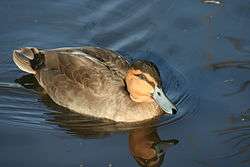Philippine duck
The Philippine duck (Anas luzonica) is a large dabbling duck of the genus Anas. Its native name is papan. It is endemic to the Philippines. As few as 5,000 may remain. Overhunting and habitat loss has contributed to its decline.
| Philippine duck | |
|---|---|
 | |
| Scientific classification | |
| Kingdom: | Animalia |
| Phylum: | Chordata |
| Class: | Aves |
| Order: | Anseriformes |
| Family: | Anatidae |
| Genus: | Anas |
| Species: | A. luzonica |
| Binomial name | |
| Anas luzonica Fraser, 1839 | |
It has a black crown, nape and eye stripe, with a cinnamon head and neck. Rest of body is greyish brown with a bright green speculum. Its legs are greyish brown, and its bill is blue grey.
It eats shrimp, fish, insects, and vegetation, and it frequents all types of wetlands.[2]
Footnotes
- BirdLife International (2012). "Anas luzonica". IUCN Red List of Threatened Species. 2012. Retrieved 26 November 2013.CS1 maint: ref=harv (link)
- http://www.birdlife.org/datazone/species/index.html?action=SpcHTMDetails.asp&sid=439&m=0
gollark: Um.
gollark: And ~10 users.
gollark: We have ~35 bots.
gollark: Muahahaha. Heavserver time!
gollark: https://top.gg/bot/510789298321096704
This article is issued from Wikipedia. The text is licensed under Creative Commons - Attribution - Sharealike. Additional terms may apply for the media files.
